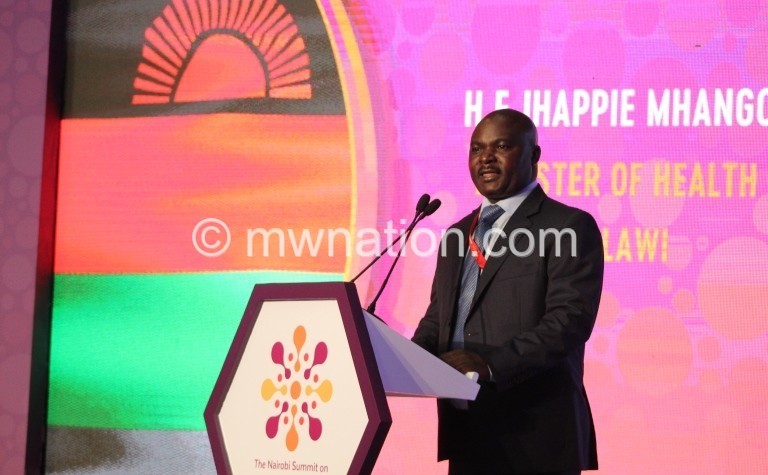Malawi commits to end child marriages by 2030
Minister of Health Jappie Mhango has made a bold commitment that Malawi targets to end child marriages by 2030 in a bid to achieve sustainable population and development.
Ending child marriages is one of the country’s 10 commitments the minister presented yesterday at the International Conference on Population and Development (ICPD25) in Nairobi, Kenya.

He said: “Malawi will end child marriage by 2030.”
But the pledge could be a tall order for the Malawi Government to achieve within 10 years as, according to a 2018 United Nations Children’s Fund (Unicef) report, one in every two girls in Malawi are married by the age of 18, one of the highest child marriage rates in southern Africa. Early pregnancies are also rife, with about one in three girls giving birth by their 18th birthday.
But Mhango said government is equipped to deal with the challenges to ensure Malawi’s sustainable development.
In an interview after presenting the commitments, the minister said: “You are aware that government announced new policies, one of which is that no girl gets married before the age of 18 and people are now actually going to jail for supporting child marriages. So, we want to ensure that by 2030, we have zero child marriage in our country.”
The minister also committed that government will provide 12 years of free education to every child by 2030, adding that the country will work with partners to meet the goals.
In 1994, Malawi introduced free primary education policy, ensuring children have eight years of free education. The policy led to increased primary school enrolment which experts have argued has compromised quality of education as government did not have supporting infrastructure and resources to ensure all primary school children transition to secondary school.
According to the Unicef report, only 38.4 percent of children transition from primary to secondary school (40.9 percent for boys and 35.8 percent for girls). Of these, only eight percent move on to tertiary education.
Reads the report in part: “Net enrolment rate for secondary school is very low, estimated at 16 percent in 2017 for both boys and girls.”
But Mhango said government is already making progress towards achieving education for all.
He said: “With the coming of the 250 secondary schools that government is going to build with support from the United States Government, we want to ensure that we migrate all Standard Eight pupils into secondary school. So, no one will be left behind.”
Malawi’s other commitments include reducing unmet need for family planning from the current 26 percent to 11 percent by 2030, lowering maternal mortality to 110 per 100 000 live births from the current 435 and increasing budgetary allocation to reproductive, maternal, neonatal, child and adolescent health information and services.
Reacting to the commitments in an interview at the summit, health rights activist Maziko Matemba commended government for the bold commitments, but called for a reflection on the commitments that Malawi made at the 1994 ICPD in Cairo and see which areas to prioritise.
He said: “We need to look back over the past 25 years and see where are the challenges, what are the areas we need to improve on in the new commitments.”
Speaking earlier on the commitments made by 51 governments at the summit, Kenya’s First Lady Margaret Kenyatta said: “I urge us to stand together to pledge to fulfil the ICPD commitments by 2030, and to build sustainable solutions for an inclusive and more equal world.”
Convened by UNFPA and the governments of Kenya and Denmark, the summit seeks to mobilise political will and financial commitments from leaders to urgently implement the ICPD25 Programme of Action in line with the Sustainable Development Goals (SDGs).





